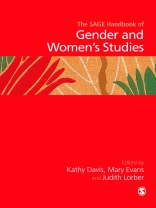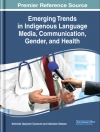This breathtakingly broad, interdisciplinary reader demonstrates how widely feminist thinking has spread, how deeply it has shaken settled assumptions in the disciplines and how much new light it throws on contemporary controversies.
— Myra Marx Ferree, University of Wisconsin-Madison
‘A timely intervention and highly engaged, thoughtful and scholarly analysis of the state of gender and women′s studies in the West by three eminent feminist scholars… Highly cognisant of the central issues that have fractured, blocked and enhanced western feminism.’
— Bev Skeggs, Goldsmiths
‘The comprehensiveness and the interdisciplinary range of themes are impressive, and they make the Handbook into a wonderful tool for teachers and students of women′s and gender studies.‘
— Nina Lykke, Linkoeping University
Gender and women′s studies is one of the most challenging fields within the social sciences — the dynamics of gender relations and the social and cultural implications of gender constructions offer a lively forum of debate.
The Handbook of Gender and Women′s Studies presents a comprehensive and engaging review of the most recent developments within the field, including the study of masculinity, the feminist implications of postmodernism, the ′cultural turn′ and globalization. The authors review current research and offer critical analyses of women′s and gender studies in work, the welfare state, family, education, religion, violence and war and feminist global politics.
Edited by three leading academics from Europe and the United States, and with 25 chapters written by scholars based throughout the world, the Handbook situates the most important debates in the field within a uniquely international and interdisciplinary context. The Handbook is a useful introduction to gender theory and an exciting starting-point for fresh debates.
Содержание
Introduction — Kathy Davis, Mary Evans and Judith Lorber
PART ONE: CURRENT STATE OF WOMEN′S STUDIES, GENDER STUDIES AND STUDIES OF MEN
The Life and Times of Academic Feminism — Clare Hemmings
The Shadow and the Substance — Wendy Cealey Harrison
The Sex/Gender Debate
Changing Studies on Men and Masculinities — Jeff Hearn and Michael Kimmel
PART TWO: CULTURAL REPRESENTATIONS AND CRITIQUES
Gendered Cultures — Gabriele Griffin
The Social Foundations of the Sacred — Bronwyn Winter
Feminists and the Politics of Religion
The Crisis in Masculinity — David Morgan
PART THREE: KNOWLEDGE
Clearing Ground and Making Connections — Carolyn Di Palma and Kathy Ferguson
Modernism, Postmodernism, Feminism
Critical Interventions in Feminist Epistemology — Lorraine Code
Gender, Change and Education — Diana Leonard
PART FOUR: GLOBALIZATION AND THE STATE
Gender in a Global World — Miri Song
Insiders and Outsiders — Barbara Einhorn
Within and Beyond the Gendered Nation
Towards a New Theorizing of Women, Gender and War — Dubravka Zarkov
Mothers and Muslims, Sisters and Soujourners — Baukje Prins
The Contested Boundaries of Feminist Citizenship
PART FIVE: WORK AND FAMILY
Working with Gender — Rosemary Crompton
Gender, Care and the Welfare State — Clare Ungerson
Coming Together Through Change — Molly Monahan Lang and Barbara Risman
Family Diversity and Gender Convergence
PART SIX: INTIMATE RELATIONSHIPS AND SEXUALITIES
Thinking Straight, Acting Bent — Chrys Ingraham
Heteronormativity and Homosexuality
Foregrounding Friendship — Sasha Roseneil
Feminist Pasts, Feminist Futures
Transgendering — Wendy Mc Kenna and Suzanne Kessler
Blurring the Boundaries of Gender
PART SEVEN: EMBODIMENT IN A TECHNOLOGICAL WORLD
Gendered Bodies — Sharyn Roach Anleu
Between Conformity and Autonomy
The Natural World and the Nature of Gender — Irmgard Schultz
Gendered Science and Feminist Critiques of Technology — Jutta Weber
PART EIGHT: MAKING CHANGE
Moral Perspectives — Joan Tronto
Gender, Ethics and Political Theory
Having It All — Sue Wise and Liz Stanley
Feminist Fractured Foundationalism
From Autonomy to Solidarities — Manisha Desai
Transnational Feminist Political Strategies
Utopian Visions — Judith Lorber
A World Without Gender?
Getting Real — Mary Evans
Contextualising Gender
Feminist Politics of Location — Kathy Davis
Об авторе
Judith Lorber (born November 28, 1931) is Professor Emerita of Sociology and Women’s Studies at The CUNY Graduate Center and Brooklyn College of the City University of New York. She is a foundational theorist of social construction of gender difference and has more recently called for a de-gendering of the social world.
Lorber was actively involved in Sociologists for Women in Society from the early 1970′s. She developed and taught some of the first courses in the sociology of gender, women′s studies, and feminist theory at Brooklyn College and the Graduate School, where she was the first Coordinator of the Women′s Studies Certificate Program in 1988-1991. She was Chair of the ASA Sex and Gender Section in 1992-93 and was awarded the Jessie Bernard Award in 1996 “in recognition of scholarly work that has enlarged the horizons of sociology to encompass fully the role of women in society.












